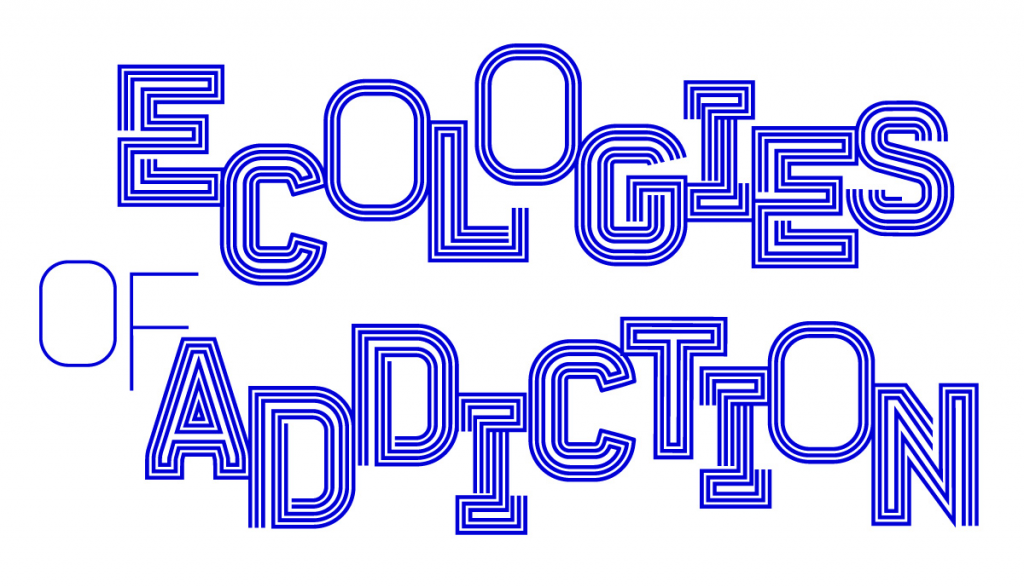
In 2015, Van Alen Institute and Sustainable Society Network+ launched Ecologies of Addiction, an interdisciplinary research initiative into the relationships between addictive disorders and urban environments. An open call for proposals was issued with the launch. The initiative’s research team, which includes a neuroscientist, two landscape architects, and an artist, developed a smartphone app they called Urban Mind. The app was used to examine how even brief encounters with nature—hearing birdsongs, encountering trees, catching a glimpse of the sky—can improve mental well-being.
The resulting study, published this month in the journal BioScience, sheds new light on how nature in cities impacts city-dwellers, particularly those vulnerable to addictive disorders, and suggests exciting possibilities for the future of mental health, planning and urban design.
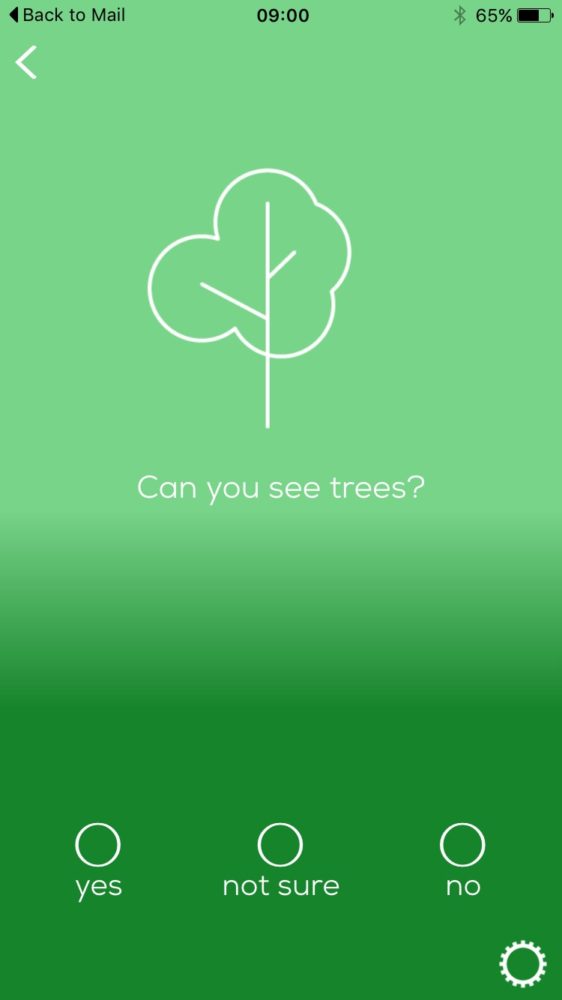
To collect data, the London-based research team developed a smartphone app called Urban Mind. After downloading the app, participants received questions asking them to describe interactions with nature in real time and their emotional well-being at that moment. The app delivered the following questions seven times a day for seven days:
- Are you indoors or outdoors?
- Can you see trees?
- Do you feel in contact with nature?
- Can you hear birds singing?
- Can you see or hear water?
- Can you see the sky?
Along with providing basic demographic information (age, gender, occupation, education), participants were assessed on their mental well-being and their trait impulsivity, a psychological measure of one’s tendency to behave with little forethought or consideration of the consequences. Higher levels of trait impulsivity suggest a greater risk of mental health issues such as ADHD, bipolar disorder, and addictive disorders.
The Urban Mind app monitored 108 individuals who collectively completed 3,013 assessments during a one-week period.
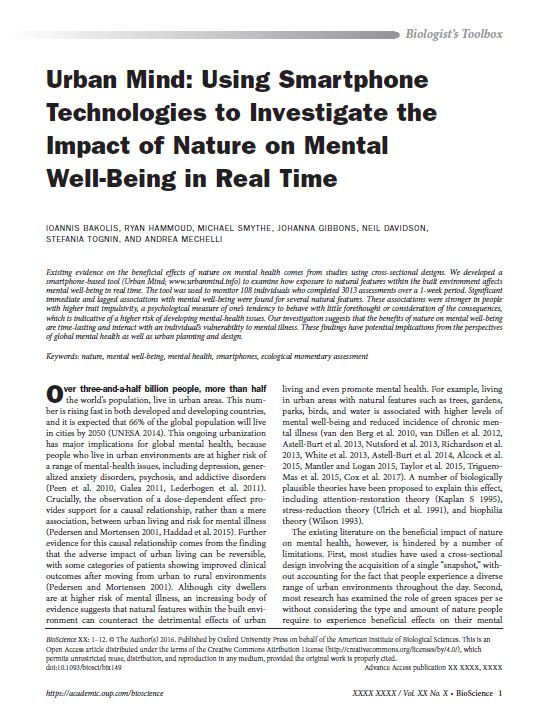
The researchers’ work has produced three key findings:
- Being outdoors, seeing trees, hearing birdsongs, seeing the sky, and feeling in contact with nature were associated with higher levels of mental wellbeing.
- The beneficial effects of interactions with nature linger over time.
- The beneficial effects of nature were greater in people with higher levels of trait impulsivity (and at a greater risk of mental illness).
The researchers found significant immediate associations between improved mental wellbeing and momentary encounters with trees, birdsongs, and the sky. In addition, these associations were evident several hours later, with the effects of seeing trees and the sky lasting approximately two hours and 25 minutes, and the effects of feeling in contact with nature lasting about four hours and 50 minutes.
Importantly, and in line with Ecologies of Addiction’s project focus, the researchers also found that people at higher risk of addictive disorders experienced an even stronger positive effect. Encountering trees and birdsongs, being outside, and feeling in contact with nature all had greater impact upon people with higher levels of trait impulsivity than those who did not.
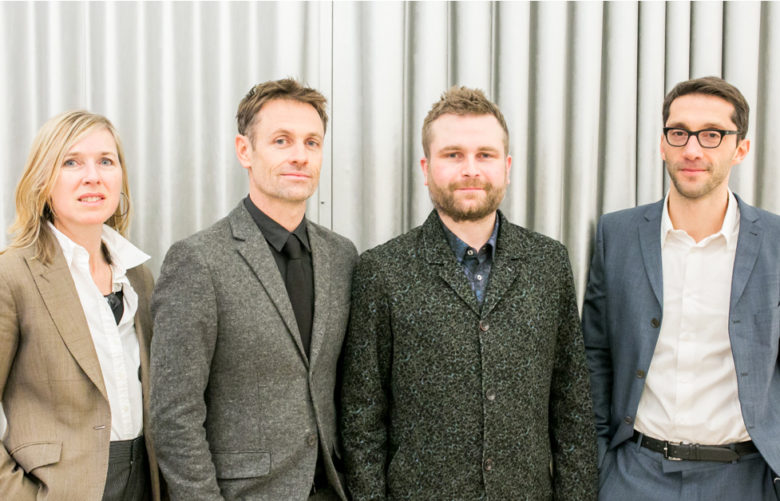
These findings—that brief encounters with nature can have beneficial effects that linger throughout the day and that these effects are stronger for individuals particularly vulnerable to poor mental health—are a significant contribution to existing knowledge about how cities impact mental well-being.
The effects of nature captured in this study carry important implications for how city-makers incorporate trees, water, and other natural features into urban neighborhoods. Knowledge that the effects of exposure to nature can follow people throughout all parts of the built environment for many hours will hopefully inspire designers, planners, and other professionals to include natural elements at a wider variety of scales and with greater intention.
This sentiment is echoed by the research team. It argues that while past research has examined the role of green spaces in general, this study offers valuable insight on the types and amounts of nature that may generate beneficial effects. The team believes this line of research will lead to the development of low-cost scalable interventions aimed at promoting mental health in urban populations. Moreover, by providing designers and planners with a much-needed evidence base, the study may inform future investments and policies related to mental health that rely less on conventional wisdom and more on scientific data.
Important to the research of mental illness, the team confirmed the feasibility of testing interactions between the design of cities and the personal characteristics of residents. By demonstrating the significant interaction between trait impulsivity (an individual’s susceptibility to mental health issues like addictive disorders) and urban environments, the team has paved the way for future studies to test other indicators of a person’s predisposition to addiction and poor mental health apart from trait impulsivity. This suggests great potential for understanding the complex relationships between cities and the mental well-being of residents.
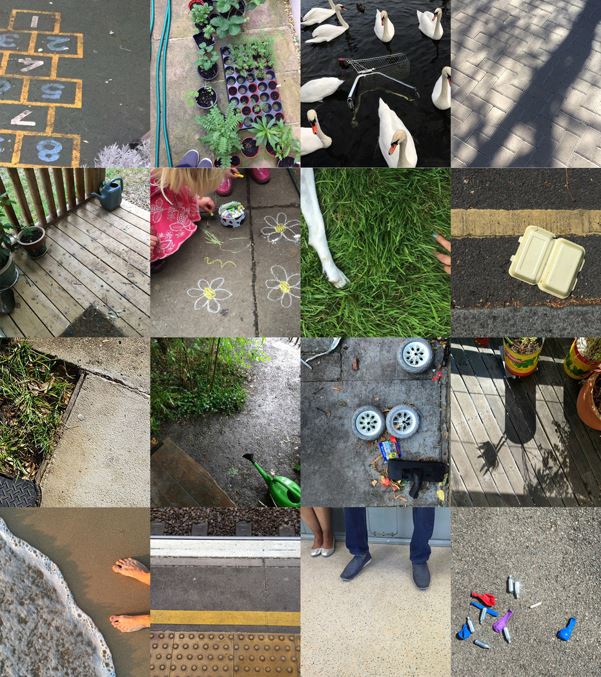
In conclusion, this study made several valuable contributions to what we understand about healthy cities and the way that knowledge is acquired. First, the research team built significantly upon existing research on urban environments, the effects of nature, and mental wellbeing. Second, the study represents an innovative application of smartphone technology to collect data from the real world in real time, providing insight into how people experience a variety of urban environments throughout the day. Lastly, the cross-disciplinary nature of the study resulted in findings with relevance for multiple fields, namely mental health, urban planning, and design.
The study is also an exemplary case of citizen science. Through the app, participants were able to capture images and audio of their surroundings at the moment of assessment, giving people the chance to observe and share how their neighborhoods and environments impact them. Lucia Robertson, a participant on the project, said, “Using the Urban Mind app made me more aware of my surroundings and how these affect my state of mind. It encouraged me to think hard about what kind of city I want to live in.” Inviting more people to develop that awareness, while contributing more robust scientific data for mental health interventions in cities, is an essential priority of the research team going forward.
While the implications of this research are exciting, it is worth remembering that no research study comes without its limitations. In the next phase of their project, set to launch in the first quarter of 2018, the research team hopes to improve upon the previous study by recruiting a more diverse sample and investigating how greater demographic and socioeconomic variety impacts their results.
As Van Alen continues to explore the intersection of urban environments and mental wellbeing, supporting innovative, ground-breaking, and cross-disciplinary research along the way, we thank the Ecologies of Addiction team for their outstanding contribution to the project, and look forward to sharing their future work with our audience of urbanists and city-makers!
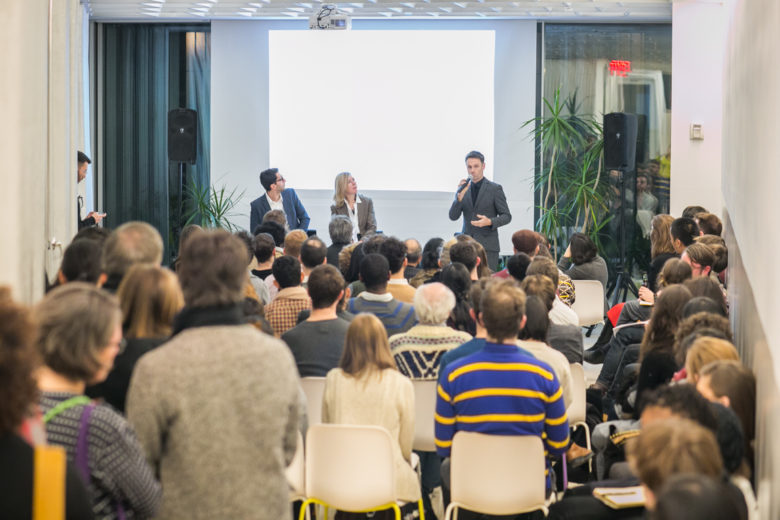
Van Alen would like to thank the following individuals and organizations for their contributions throughout the Ecologies of Addiction project:
RESEARCH TEAM
- Dr. Andrea Mechelli, Institute of Psychiatry, Psychology & Neuroscience, King’s College London, London, UK
- Johanna Gibbons, J&L Gibbons Landscape Architecture Urban Design, London, UK
- Neil Davidson, J&L Gibbons Landscape Architecture Urban Design, London, UK
- Michael Smythe, Nomad Projects, London, UK
VAN ALEN INSTITUTE
- David van der Leer, Executive Director
- Anne Guiney, Director of Strategic Initiatives
- Andrew Brown, Associate Director of Research
SUSTAINABLE SOCIETY NETWORK+
- Dr. Catherine Mulligan, Principal Investigator, Imperial College London, London, UK
- Stephen Lorimer, Network Coordinator and Research Associate, Imperial College London, London, UK
PROJECT ADVISORS
- Dr. Tom Albright, Salk Institute, La Jolla, CA
- Dr. Andrea Barthwell, Medical Director, Two Dreams Chicago, Chicago, IL
- Dr. Mark Hansen, Director, Brown Institute for Media Innovation, Columbia University, New York, NY
- Dr. Karen Lee, New York City Department of Mental Health and Hygiene, New York, NY
- Robert Richardson, Senior Advisor, New York City Technology Development Corporation, New York, NY
- Sarah Williams, Director, Civic Data Design Lab, Massachusetts Institute of Technology, Cambridge, MA
Note: In the acknowledgements of the research team’s published study, “Urban Mind: Using Smartphone Technologies to Investigate the Impact of Nature on Mental Well-Being in Real Time,” it is suggested that Van Alen issued the team a grant for their research. Van Alen is not a grant-making institution.








